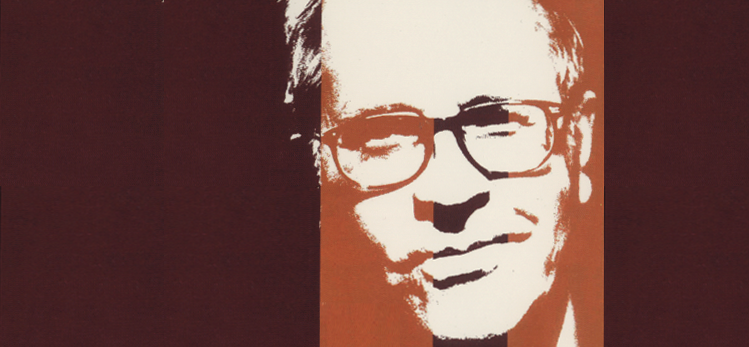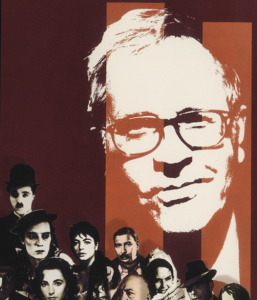Il sorriso di Peter. In ricordo di Peter von Bagh: cinefilo, regista, storico del cinema, amico

Abbiamo raccolto cinque brevi ricordi di chi Peter von Bagh l’ha conosciuto, stimato, amato.
Matti Bye, musicista
When I´m thinking of Peter I see an indian chief strolling around in the midnightsummer forest of Sodankylä.
A wise man with a special warm humour. He had a special way of smiling that reminded you that this was a humanist and that he wanted to share his knowledge and wisdom with all people.
He invited me to come and play my music for silent films in Sodankylä and to Bologna, and for this reason I discovered so many beautiful films and met so many interesting people.
I’m so thankful for these film festivals experiences he invited me to and I miss Peter very much.
*****
Marcela Cassinelli, presidente della Fundación Cinemateca Argentina
Hace años cuando conocí a Peter me dijeron ¨cuidado con este finlandes loco¨, pero quien me dio ese consejo no tuvo en cuenta que yo era argentina… y nos hicimos amigos al instante, hay una expresión que lo define ¨Hermano del alma¨ y así se sentía.
Siempre lo recordaré con una inmensa sonrisa, con los brazos extendidos listos para dar un abrazo de oso, preguntándome en el camino entre el cine Arlecchino y la Cineteca ¨que viste hoy?¨
Fuimos afortunados de compartir su pasión por el cine en cada edición de Il Cinema Ritrovato.
Peter forever! Un cálido recuerdo desde Buenos Aires.
*****
Bernard Eisenschitz, storico e critico cinematografico
Bologna, June 27, 16:15, Paris calling. I am sure you have talked or will talk about all things that Peter was for all of us. The “doctor of nothing” as he said, the program curator, the cinéphile, the film director and editor, the universal memory, the writer, the host in Helsinki, Sodankylä and Bologna, the traveler and friend. Since the book that two of you have compiled about him was called Citizen Peter, I might just suggest to reverse the terms and think about Peter as a citizen.
It has to start with the love of film. Love of film is not the universal blessing one usually thinks. It is generally an individualistic emotion, selfish and mostly masculine. Moving from the very real joy of the collector-viewer, a joy Peter called “infantile” with a great dose of self-irony, to the idea of sharing that experience with an unknown crowd, is not obvious. But that was what his work was about.
He was the only festival artistic director that I’ve met who insisted on seeing the films he had selected during the festival. Not that he hadn’t seen them, but he needed the feel of the spectators. We went into the Cinema Arlecchino one morning as he wanted to check the projection of The Ten Commandments and we stayed, maybe not the whole four hours, but a good two. It was not absent-mindedness. It was showing works that mattered to him, respecting the audience and listening to it reacting. Something that I’ve always noticed when seeing him at work, whether with students or spectators or interviewing a filmmaker.
Why such a trivial example? (We’ll have time for more serious ones in the next few days). Because of the need for a back and forth between the individual and the larger picture. His last film, Sosialismi, shown here a year ago, a film to which he attached so much importance, which it meant so much for him to complete, starts with this quote from a Finnish writer (Pentti Haanpää?): “There is a greater self in us, the self of the species and family. People have always lived for this self. Only when he’s aware of this self can the individual see the meaning of life. In other words be happy”.
Happiness, another key to Peter… but I’ll stop here.
*****
Vera Gyürey, direttrice dell’Hungarian National Film Archive
The Cinema Ritrovato of Bologna means “A Moveable Feast” for me, a place similar to young Hemmingway’s Paris from the cited novel.
What made me this feeling were mostly the Bologna Film Archive, the personality of Peter von Bagh including his knowledge and affinity of films, his good spirit and his smiling face.
The history of films was an open book for him and he opened this book for us as well by showing and accepting different taste, values. Peter’s open mind was reflected in his programs.
Cinema Ritrovato goes on, as it is the rule, but we all feel that he cannot be replaced. We miss him already.
*****
Miguel Marías, critico cinematografico
PETER von BAGH’s AS PROGRAMMER. As anyone working for some time in a film archive, either at its head or in charge of programming its public sessions, Peter von Bagh was utterly sensible to the longtime ‘civil war’ between those considering that the mission of archives was that of merely collecting, cataloguing and keeping well preserved the prints, and the partisans, following the example of Henri Langlois, of showing what had been found, preserved or restored, since a film, however well preserved it may physically be, does not truly exist until it is seen and then preserved in our memory, and therefore, as soon as it is safe and sound to do so, must be shown.
 But once the task of cinématèques and film archives is enlarged to the diffusion or promotion of film and the permanent revision of film history and the widening of film culture, the next issue one must keep in mind is how to 1) attract the audiences, so that the efforts of the archive are not in vain, and 2) elaborate a programme which is not only attractive but can help to reflect on the history of the cinema and the mysterious links often found between quite different movies from distant countries and separated by decades. That’s one of the things Langlois mastered like very few other people (Jacques Ledoux among them): his seemingly random, disorderly daily programmes of four films could certainly jump from France to Japan to the United States and finally to Italy, and from the ‘20s to the ‘30s to the ‘50s and to the ‘60s. But if you watched the four films, or recalled well those you did not, you could notice that there was a mysterious relationship between the four films: either by contrast or resemblance, they threw a new light upon each other regardless of chronology.
But once the task of cinématèques and film archives is enlarged to the diffusion or promotion of film and the permanent revision of film history and the widening of film culture, the next issue one must keep in mind is how to 1) attract the audiences, so that the efforts of the archive are not in vain, and 2) elaborate a programme which is not only attractive but can help to reflect on the history of the cinema and the mysterious links often found between quite different movies from distant countries and separated by decades. That’s one of the things Langlois mastered like very few other people (Jacques Ledoux among them): his seemingly random, disorderly daily programmes of four films could certainly jump from France to Japan to the United States and finally to Italy, and from the ‘20s to the ‘30s to the ‘50s and to the ‘60s. But if you watched the four films, or recalled well those you did not, you could notice that there was a mysterious relationship between the four films: either by contrast or resemblance, they threw a new light upon each other regardless of chronology.
Peter von Bagh not only programmed for some time the sessions of the Finnish film archive, but also a repertory film theatre in Helsinki and the Midnight Sun Film Festival at Sodankylä in Finnish Lapland since 1986 until last year, and was artistic director for Il Cinema Ritrovato these last years. This means he was most of the time reflecting on what to show, together with what other films, where and how. What filmmakers had been unjustly neglected or formerly celebrated but forgotten for decades, which countries had been never explored and what periods sorely misappreciated?
Since Peter von Bagh was, among many other things, a thinker, a thoroughly thinking man, not someone catching the latest trend spun at Cannes or wherever else, nor someone who followed second-hand notions and repeated like a parrot what was generally considered to be the latest “correct”, consensual ideas, he was rather a searcher, intent on finding or discovering new, different, meglected, unheard of things: unattended filmmakers and unseen movies which deserved more attention and interest than they had received until then. So, Peter helped us to discover or recover what we had been missing or had lost from sight. A form like any other of spiritually (and not only materially) retrieving and restoring films.
*****
Leggi anche gli articoli Lezione di cinema: ‘I 1000 occhi del dr. von Bagh’ e David Bordwell: tributes to Peter von Bagh, a great friend.


